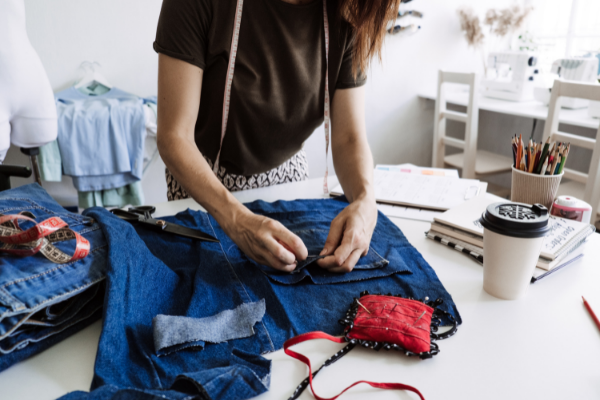With its reputation for CO2 emissions, excessive water and energy consumption, and use of microplastics, the textile industry is well known for having a negative impact on the global environment. Add to this a notorious record when it comes to unrepresentative working conditions and overconsumption of clothing and accessories, and the industry could really do with its own makeover.
And that is what some actors, consumers and project promoters in the industry are doing by breaking the codes of fashion and putting ecology at the centre of their concerns. Among them are several Belgian initiatives that are saying NO to "fast fashion".
Despite fast fashion’s current popularity, more responsible alternatives are germinating every year in the four corners of the globe.
Renting clothes
Among these are thrift stores and second-hand platforms but also rental shops such as Coucou, a Brussels brand for renting clothes and accessories for events. "The textile industry is the second most polluting in the world," explains Isabelle d'Otreppe, co-founder of the concept.
"Each garment emits 20 times its weight in greenhouse gases in production. So, if you can avoid buying unnecessarily, do it! With Coucou, we wanted to propose a fun, economical, sustainable and ethical concept. Our goal is to show that you can have a perfectly fashionable outfit while consuming differently, that is to say by renting your clothes."
And Coucou is not the only shop to offer this clothing rental service in Belgium. The concept is spreading more and more in the country. In 2020, for example, Jukebox was born, a similar concept store to Coucou, which offers to rent everyday clothes. The Slow31 boutique, meanwhile, has launched a kind of shared wardrobe of the same ilk in Liège.
The experience of upcycling
Belgians throw away nearly 15 kilos of clothes per year. Faced with this waste, the second-hand sector is flourishing, but upcycling, namely the transformation of second-hand clothes to create new clothes, is also becoming popular. It is a concept that goes beyond simple recovery, because it aims to give added value to clothes and accessories intended to be discarded.
Thaïs and Annabelle tried the experience of upcycling with Méson Brussels, a 100% Belgian brand that gives a second chance to linen and fabric scraps.
Diane and Julie, too, embarked on the same adventure. They now offer upcycling of furniture, which, while different because of the product, is substantially the same concept. These two Brussels residents have launched Junk No More, a workshop located in the heart of Saint-Gilles in which they sand, nail and transform old objects into new furniture.
Related News
- High demand for second-hand clothes as high street chains discover the market
- Half of Belgians bought second-hand in 2021
Whether it is creating something new from something old or making something new in a more sustainable and respectful way, what is certain is that the trend today is towards transparency. Consumers want to know more about manufacturing processes, company history, development projects, etc. Many brands have understood this.
More and more brands are deciding to align themselves with new production standards that respect the planet. Among these are young brands, such as CalbART and Le Slibard, manufacturers of ethical underwear, or Bonjour Maurice, a brand of reversible sustainable clothing for children.
To cope with the environmental and social consequences of fast fashion, we can all look to change our habits to be more responsible when it comes to consumption and use. But we can also opt for a more ethical approach to the design and production of clothing.

